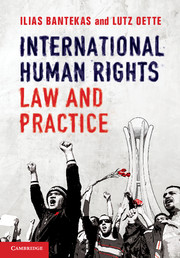Book contents
- Frontmatter
- Contents
- List of abbreviations
- Table of Cases
- Introduction
- 1 International human rights law and notions of human rights: foundations, achievements and challenges
- 2 International human rights law: the normative framework
- 3 Human rights in practice
- 4 The United Nations Charter system
- 5 The UN human rights treaty system
- 6 Regional human rights treaty systems
- 7 Individual complaints procedures
- 8 Civil and political rights
- 9 Economic, social and cultural rights
- 10 Group rights: self-determination, minorities and indigenous peoples
- 11 The human rights of women
- 12 The right to development, poverty and related rights
- 13 Victims’ rights and reparation
- 14 The application of human rights in armed conflict and the international criminalisation process
- 15 Human rights and counter-terrorism
- 16 Non-state actors and human rights
- 17 Globalisation and its impact on human rights
- Index
- References
9 - Economic, social and cultural rights
- Frontmatter
- Contents
- List of abbreviations
- Table of Cases
- Introduction
- 1 International human rights law and notions of human rights: foundations, achievements and challenges
- 2 International human rights law: the normative framework
- 3 Human rights in practice
- 4 The United Nations Charter system
- 5 The UN human rights treaty system
- 6 Regional human rights treaty systems
- 7 Individual complaints procedures
- 8 Civil and political rights
- 9 Economic, social and cultural rights
- 10 Group rights: self-determination, minorities and indigenous peoples
- 11 The human rights of women
- 12 The right to development, poverty and related rights
- 13 Victims’ rights and reparation
- 14 The application of human rights in armed conflict and the international criminalisation process
- 15 Human rights and counter-terrorism
- 16 Non-state actors and human rights
- 17 Globalisation and its impact on human rights
- Index
- References
Summary
Introduction
Economic, social and cultural (ESC) rights include a number of entitlements, such as the right to work and the enjoyment of just and favourable conditions of work; the right to form and join trade unions; the right to social security; the protection of the family, mothers and children; the right to an adequate standard of living, which includes adequate food, clothing and housing and continuous improvement of living conditions; the right to the highest attainable standard of mental health; the right to education; and the right to participate in cultural life and enjoy the benefits of scientific progress. All these are protected under ICESCR.
Several differences are traditionally cited to distinguish the disparate legal nature of ESC and civil and political rights. Whereas states are obliged to implement the latter immediately, most ESC rights are subject to progressive realisation under the terms of the ICESCR. Moreover, because civil and political rights are considered negative obligations and thus generally only require entrenchment in the legal order of states, they are justiciable and enforceable before the courts. On the other hand, a number of states suggest that ESC rights are not justiciable, not only because they are not immediately realisable but also because their implementation requires funds and resources which parties may not possess. Thus, resource scarcity is a significant impediment to the fulfilment of ESC rights, but is also a justification for those states that are unwilling to invest money in social welfare services, especially towards the vulnerable, marginalised and the indigent. These issues will be explored in detail in this chapter.
- Type
- Chapter
- Information
- International Human Rights Law and Practice , pp. 366 - 408Publisher: Cambridge University PressPrint publication year: 2013



